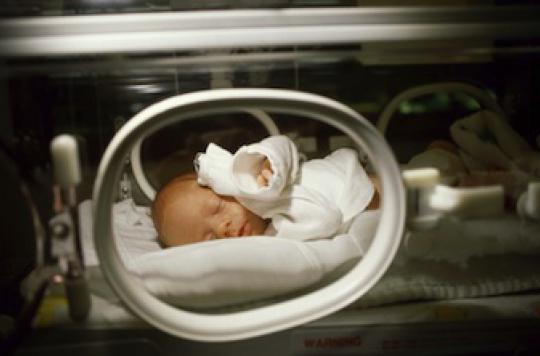Babies born before term swaddled in a sleeping bag would be more stressed than babies dressed in a simple bodysuit, according to a French study.

Bodysuit or sleeping bag? A question not to be taken lightly because the clothes of premature babies have an impact on their behavior and their stress level, according to a French study published on Tuesday.
A team of researchers from the animal and human ethology laboratory (CNRS / University of Rennes 1), in collaboration with a neonatologist pediatrician from the CHRU in Brest, observed that babies wrapped in a sleeping bag are less active and touch their bodies less frequently. than newborns in bodysuits.
According to the authors, sleeping bags hinder the movements of babies, “and therefore, comforting self-contact gestures are rarer in them”. They would then be more stressed than the others.
Swaddling
At birth, a baby born before term does not know how to regulate its body temperature. It must therefore be installed in an environment that protects it from the cold. This is the role of the incubator, also called an incubator. There are two types of model: closed or open, surmounted by a radiant lamp for heat, in which the child wears a simple body. When he begins to be able to regulate his temperature on his own, the lamp is turned off and the child is dressed in pajamas, a waistcoat and swaddled in a sleeping bag.
To assess the impact of clothing on preterm babies (38 weeks pregnant), scientists followed 18 premature babies aged 34 to 37 weeks. For several hours spread over 2 to 4 days, the children were filmed. Of these, 9 were in an open incubator with a heat lamp while the other half wore the pajamas, waistcoat and sleeping bag.
Stress and insecurity
Watching the videos, the researchers noticed a big difference between the two groups. Babies in bodysuits had “more often their arms folded and their hands were more often in contact with their environment or their head (the only accessible part)”, indicate the authors. Whereas, on the contrary, the babies in sleeping bags had their arms outstretched and their hands closed, and did not touch anything. “Raising their arms with this clothing set seemed to require too much physical effort for these babies weighing less than 2 kg,” they explain.
An obstacle which is not without consequences for these children born before term, in particular during hospitalization. Indeed, “without frequent tactile contact with a parent, self-contact could even be a crucial form of compensation,” say the researchers. By imposing a physical constraint on the child, the sleeping bag increases his stress and “gives him a feeling of helplessness”.
In addition to this immediate effect, researchers now want to know if the motor and emotional development of these babies is impacted over a longer term.
.















